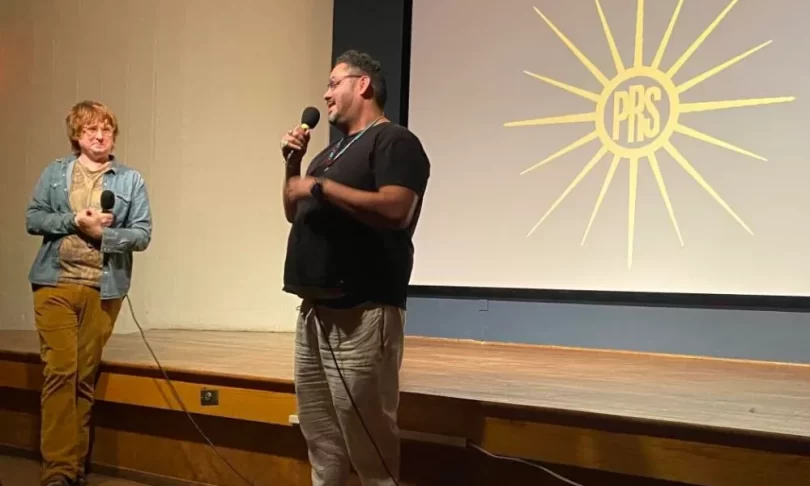HOLLYWOOD – Tragedies take many forms. There are tragic stories of individuals who deserved a wonderful existence, who were taken obscenely early in lives full of promise. Then there are tragedies where someone with a great contribution to the world is cut down in their prime and we are deprived of a unique talent.
The tragedy of Karen Carpenter embodied both. She was “the voice” of her time, and in many ways has become established as one of the rare classic voices that will extend to all times. Her warm deep melodic tones conveyed beautiful melancholic rainy days and Mondays to top of the world euphoria, to taking us back to connect with yesterday once more. We won’t even talk about how it brought us the warmth of a holiday fire and a Merry Christmas, darling.
Her voice was so perfect that many thought it was not real, that it had been manufactured by her brother Richard’s studio magic. Fil Henley of Wings of Pegasus recently did an analysis of Karen’s voice from her live singing versus her studio vocals. He declared, “Karen’s waveforms are INSANE. When it comes to vocal accuracy and pitch… due to Karen’s accuracy, pitchwise and ability to hold a note on pitch, she is dead on. These were not autotune waveforms, in fact this was before autotune was invented… but these are the most dead on that I have seen in my life.”
Karen has been dead for exactly forty years from the effects of anorexia nervosa, but her loss still inspires intrigue around the demons that took her and silenced her for good. Speculation has fueled articles and movies ranging from a video version of her life told in Barbie dolls, to a Cynthia Gibb led Movie of the Week. In each re-examination, proverbially, “layers of the onion” get pulled back.
None have pulled as deeply as a new documentary called Karen Carpenter, Starving for Perfection, which premiered this last week at the Santa Barbara Film Festival. The documentary was produced by author Randy L. Schmidt and based on his bestselling book Little Girl Blue.
Starving takes filmgoers deep into Karen’s story in ways her life has not been discussed before. It brings fresh new perspectives and insights about her personal struggle told in her own voice through never-before released recordings and through the voices of those who knew her including Carol Burnett, Olivia Newton-John, Suzanne Somers. There are also interviews with Cynthia Gibb who portrayed her, and with Belinda Carlisle, Kristin Chenoweth, and Carnie Wilson whose own careers were inspired by Karen’s music.
The convergence of Randy Schmidt and Cynthia Gibb on the project represents a full circle moment in the documentary’s creation. The biopic in which Cynthia starred as “Karen Carpenter” was 13-year old Randy’s introduction to the Carpenters. He became obsessed with their records and music from that moment on. “I wanted to know everything because I had been born right in the middle of the Carpenters heyday and missed a lot of it first-hand,” he told me when he sat down for an LA Blade exclusive viewing of the film, and an interview on my Rated LGBT Radio podcast.
Cynthia’s insights in Starving were significant. She bore witness to Karen’s life more than just as an actress who had played her. Every dress she wore in the TV movie had been Karen’s. They filmed in the actual house where Karen died and both Richard and Karen’s parents were present during filming. The extras playing the EMTs in the movie were the actual first-responders who had been to the house on the day that Karen died.
Cynthia told of seeing the evidence of Karen’s anorexia first-hand. As she went through Karen’s closet, she saw the size differential go from garments too big, to Karen’s most recent, which were very tiny. Both Cynthia and Mitchell Anderson, who played Richard in the film, described the family dynamic to Randy. Harold and Agnes, Karen’s parents, were a constant presence on the set with Richard giving daily script revisions protecting the family’s image. Agnes laid the groundwork with the first day of production when she answered the door and spurt out at the film’s director,
“I did NOT kill my daughter.”
Starving does not let Agnes off as easy as the TV movie rendition did. While it does not accuse Agnes of murder, it paints a complex picture of a mother who promoted and completely worshipped her son. She was a mother, at the same time, who tended to disregard and undervalue her daughter and seemed driven to make Karen fit into the appropriate Richard-supporting role. No one in the family, Agnes, Richard or even Karen herself, seemed to find joy in Karen’s success in the spotlight that put Richard in a supporting role.
The film portrays Karen as having two driving desires—to earn the love of her mother, and to carve out some accomplishment and actualization on her own. She never seemed to attain either, and it was the striving for perfection to get them that may have killed her.
The family seems to have been driven by an inherited obsessive compulsive disorder complex. Agnes certainly had it, Richard exhibited it, and it may have exacerbated the weight obsession fueling Karen’s anorexia. Randy told me, “Olivia Newton John talked to me in the book about it, not the documentary. She said that when she went to Karen’s apartment that she noticed that all of the hangars were exactly a half inch apart, and everything was color coded as far as the clothing and the shoes. Everything was very OCD for Karen. She grew up with a mother who, the neighbor kids told me, would not only polish the locks, the gold brass locks on the windows, with a toothbrush, but then she would go next door and clean the windows of the house, the neighbor’s house, that faced hers. So, I mean, this was, this was a woman who dealt in control in just about every possible way. Karen saw that from the time she was born and didn’t know that it was unusual.”
Karen also seemed to be challenged by the feminine gender expectations thrust upon her. She had been a sports loving “tom-boy.” She was masculine in behavior, was a guy’s guy drummer hanging out with the band. In the early days, she crossed the stage “like a mack truck.” She literally got trained on how to present in a more feminine way. Randy stated, “I get asked this question quite often because I think nowadays people are tuned in: was she gay? … I don’t want to out anybody and didn’t want anybody to out me when I wasn’t ready so I never want to go there. What I feel comfortable talking about based upon my research with the friends of hers, that talked to me about some really intimate things, is that she was, I guess, she struggled with the expectations of femininity.” He added, ”There was this unmet expectation from Agnes, and maybe the reason she was a little disappointed in her daughter, that Karen was not the ideal 1950s, 1960s girly girl.”
We have to wonder if the deeper understanding now, forty years later, about the non-binary, fluidity and being one’s authentic self could have saved Karen Carpenter. We will never know. What we still know, and feel, is the shock of losing her. In the documentary, Olivia Newton John, in her last on-screen interview, showed that virtually no one experienced that shock more than she. She had been literally on her way to have lunch with Karen when she heard the news of Karen’s death announced on her car radio.
Karen famously sang of asking “perfection of a quite imperfect world.” Sadly, it may have been demanding perfection of herself and how others would perceive her that ended her own world.
She sang that all she knew of love was “how to live without it.”
Therein lies the biggest tragedy of all. There was so much love for her, and still is, that she seemed unable to accept, from millions of hearts completely willing to love her just the way she was, as a “tom boy”, as a full-figured human being and as a cherished talent. So, to Karen, we can only sing her song back to her… and hope she hears us.
“We love you in a place where there’s no space or time
We love you for your life, you are a friend of mine
And when your life is over, remember when we were together
We were alone and you were singing this song…”From A Song for You
****************************************************************************
Rob Watson is the host of the popular Hollywood-based radio/podcast show RATED LGBT RADIO.
He is an established LGBTQ columnist and blogger having written for many top online publications including Parents Magazine, the Huffington Post, LGBTQ Nation, Gay Star News, the New Civil Rights Movement, and more.
He served as Executive Editor for The Good Man Project, has appeared on MSNBC and been quoted in Business Week and Forbes Magazine.
He is CEO of Watson Writes, a marketing communications agency, and can be reached at [email protected] .







